
When I reveal to folks that I have food restrictions – this inevitably leads to questions of how to deal with various dietary concerns while on the road.
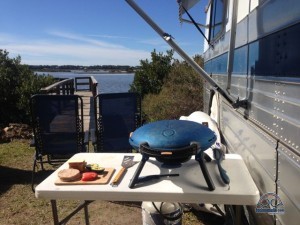
- Can you really get the foods you desire while traveling to a variety of rural and urban places?
- Will you feel you’re missing out on cultural experiences if you can’t sample all of the local cuisine?
It can be done with a bit of planning, knowing how to adapt meals & ingredients, asking for what you need, and probably doing more cooking at home.
But really, it’s not all that different than eating when you’re living stationary.
My Food Restrictions – Gluten Free Semi-Vegetarian
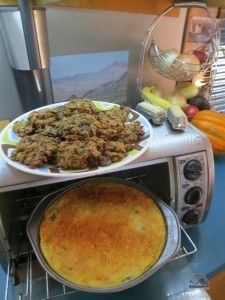
Obviously, the below is in no way intended to be dietary or medical advice – and nor am I open to debate on my dietary choices. I’m just sharing so you have some background on my decisions and how I navigate this as a traveler.
I consider myself a semi-vegetarian, and have been since high school. I eat eggs, dairy and occasionally have seafood and poultry. (Did you know that in some midwest towns, chicken is seemingly considered a vegetable?!?)
I haven’t eaten anything made from the flesh of a mammal in nearly 25 years now.
Between a dear friend having great results going gluten free and my 23andMe DNA test coming back showing a relatively higher susceptibility to Celiac, I decided to give the diet a shot.
After a month I was convinced. I felt better. I had more energy, a noticeable decrease in joint pain, clearer skin, and less digestive issues.
So there’s my primary restrictions – gluten free and semi-vegetarian.
Chris, by the way, identifies as a flexitarian freegan opportunivore – meaning that he happily defaults to vegetarian while at home, but “if it’s free – he’ll eat it”, and if it’s a regional delicacy or speciality of the house, he’ll probably take the opportunity to try it.
But in general, Chris and I both have a strong preference for non-processed whole foods, and organics. We prefer a lot of fresh vegetables & fruits, and things that don’t come out of packages. We also avoid high fructose corn syrup. When shopping at grocery stores, we generally shop the perimeter of the store.
There are of course others navigating much more restrictive diets – whether by choice or for medical reasons.
Food Challenges on the Road
Here are some of the challenges of dealing with food restrictions and/or strong preferences on the road:
Shopping Variation
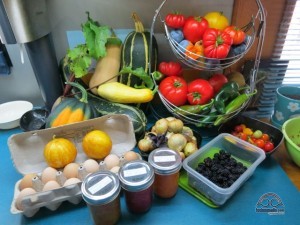
We’re always navigating different grocery stores and farmers markets. So we can’t get used to what is being carried, or even where it might be located.
If we’d really like to make a gluten free pizza, we may just not be able to find the same ingredients we used last time. This results in us being flexible to adapt to what we can find, and stocking up on harder to find items. And we love stocking up at Trader Joe’s when we find one on the road!
We actually love the variability of food suppliers we encounter on the road, and it forces us to think differently about our own food prep. I’m not big on following recipes. When I’m feeling creative, I love just going with my instincts or searching the internet for ideas.
[quote_box_left]Tip: For the rare dry goods that we want on hand, we bulk buy on Amazon.com, and have them delivered for free via our Prime account.[/quote_box_left]
We do love shopping at local farmers markets to get fresh local produce, and there are apps and website out there (such as http://www.localharvest.org) that track them. But we tend to just let serendipity present them to us in our travels.
Restaurants

Eating out can be challenging, and some dining establishments just have very limited options that meet my criteria. But usually I can find something without having to resort to a salad. I’ve gotten very comfortable about asking for modifications to menu items to meet my needs.
And some larger more progressive cities just have food restrictions down to an art form. I love visiting Austin, Portland, Madison, San Francisco and others… where it seems most restaurants have several menu selections visibly marked as being GF and vegetarian. I can almost get overwhelmed by all the options and choices!
And there are mobile apps, like Find Me Gluten Free, which help us locate restaurants that take gluten free food preparation into account. There are probably similar apps out there for most dietary restrictions.
And yes, sometimes I do just have to miss out on a region’s known food thing – like skipping VooDoo Donuts in Portland or pasties up in the UP of Michigan. I don’t feel left out on meat-centric local cuisines, as my semi-vegetarian preference is a very conscious choice I’ve made for my own reasons.
Group Functions
As a past event coordinator myself, I never expect organizers of events to cater to dietary needs – they have enough on their plates as is. But that does add some challenges in attending rallies and conferences where food is included in the price. I really appreciate it when an event presents the menu in advance, so that I can make an informed decision about what meals I’ll be able to eat – and when I need to prepare my own food.
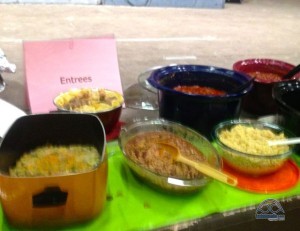
Since meals are often times part of the schedule with seminars before & after, I’m left having to decide to skip sessions to cook my own meals or opt out of the social time over meals to eat a home. But heck, I love attending events in my RV home and having the easy option to take care of my own needs.
And potlucks.. oh goodness, those can be very difficult for those with food restrictions. I always prepare a dish I can eat and make sure there is ample in case its the only thing I can eat. And, I label my dish as ‘Gluten Free Vegetarian’ and with any common food allergens listed. It would be so helpful if more food contributions were labeled as well.
As we do enjoy attending group functions like rallies, we just factor all of these things into our logistics of attending. But, it does honestly become frustrating at times.
All and all, I don’t feel that living on the road with food restrictions is too much of a problem. We cook a lot at home – it’s just easier and cheaper. But we do eat out when we have options that are close by, affordable and with flexible menus. And it always touches me when someone takes my food restrictions into account when preparing food to share with us.
Any other tips for navigating the country around food restrictions? I’d love to hear them in the comments, as I’m sure others would too.

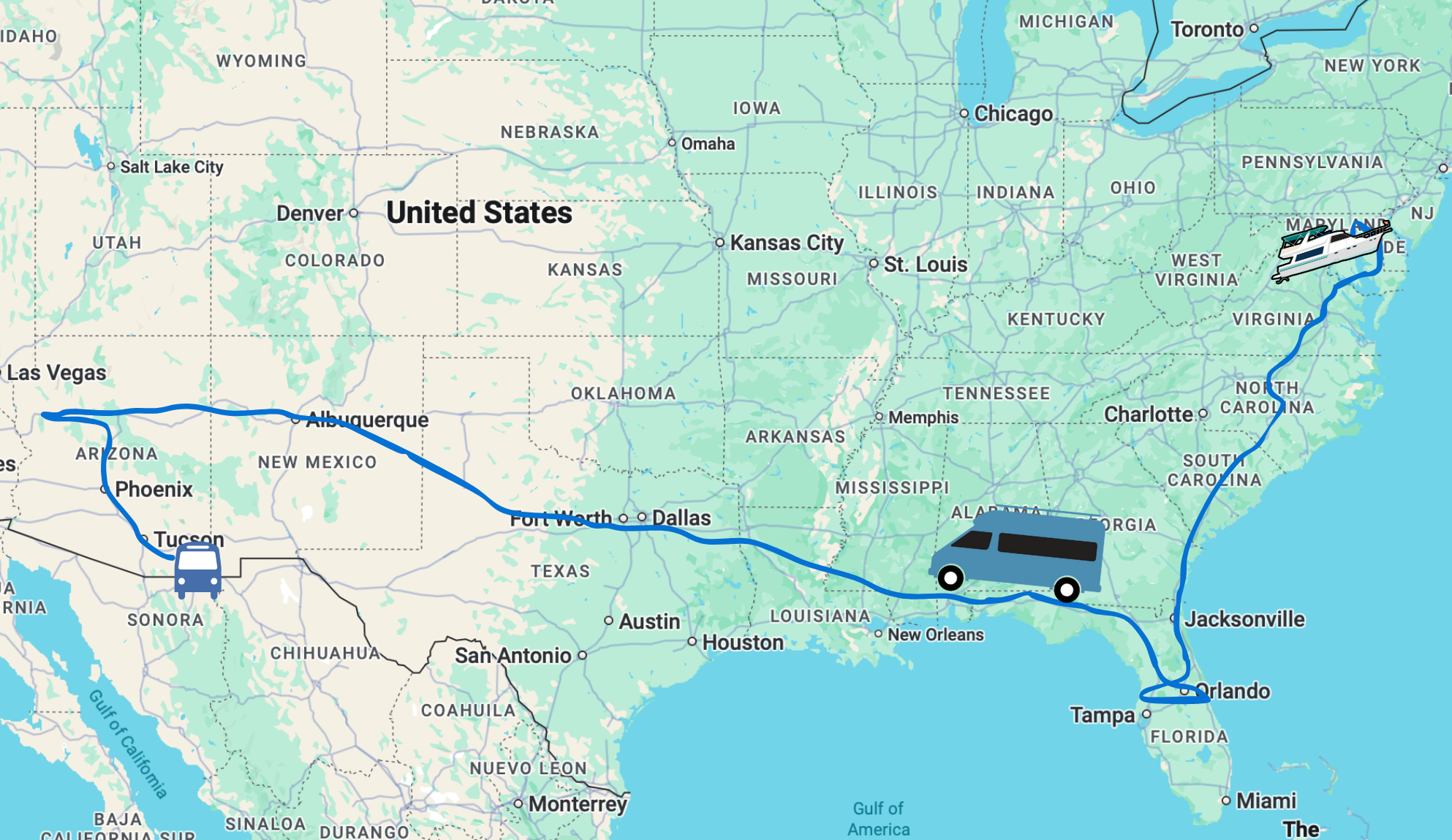
I’m planning to switch to a whole foods plant based diet, and I’m wondering how I can extend the life of produce, especially greens for salads. The rig I’m purchasing is a Class C 25′, and wow that fridge is tiny. I’m planning to be primarily in TT parks, with no toad, for my max 3 weeks. While I’d love to be shopping every couple of days for uber fresh veggies – I don’t see that happening without a car. Should I maybe add an additional 12v refrigerator to have space for veggies and greens? Are there any things I can do to the Dometic fridge to make sure it’s staying at the right temp?
Our buddies over at WheelingIt did a great article on this I’d recommend: http://wheelingit.us/2014/10/24/6-tips-to-buying-eating-fresh-on-the-road/
Try being a Vegan…some places assumes that you just mean less cheese than normal. Its funny that there is more gluten free option anywhere than Vegan since most people actually not allergic to it, it is driven by the food industry since they charge more money for it.
We as Vegan cook a lot in the RV and shop at Co-Oops, farmers markets etc. but do get weird faces when invited by other RV people for get together.
Yes, thank you for sharing… I also discovered I can order gluten free mixes from bobsredmill.com and already prepared items from Walmart.com. I wish there were more Trader Joe’s around!
Thanks for sharing the great ideas about health eating. As we prepare to start our active RVing these hints will be most valuable. I don’t think I have read a single blog from you that hasn’t provided information that will be useful in our future.
You guys blow me away with the breadth and depth of what you write about!
Keep it going. It is much appreciated!
Allan
This is definitely a conversation brought up whenever anyone discovers I eat plant-based. While I try not to “advertise” it, some people seem fascinated and want to know how it’s possible to “find food”. Well, after traveling through the U.P. and Minesota I understand…veggies are sometimes hard to come by unless you don’t mind canned or frozen. But eating whole foods, rather than processed vegan and vegetarian foods is the key for us. I rarely buy canned (unless it’s an emergency) foods and cook my own dried beans in my rice cooker. Saves a TON in space and weight…plus it’s so much cheaper and healthier. As you stated, getting back to basics and eating foods as close to their natural state makes it a lot easier to accommodate food restrictions.
A new website that is starting to gain some momentum is Ripe Near Me. I think it’s great for RVers as you can see if anyone nearby has excess fruits or veggies that they are giving away or selling. http://www.ripenear.me/
Thanks for the lead on the website.
I was diagnosed a celiac 20 years ago. Wow, have things changed. Eating out used to be negotiating cross-contamination and soy sauce land mines. Now there are GF menus, Udi’s, and Betty Crocker GF Bisquick. However, GF or not, all that stuff is still processed, so after a brief King Arthur GF Cookie Mix party, I calmed down and went back to making my own food with my preferred flours, sweeteners, and organic ingredients. Because any gluten makes me VERY sick, I must also bring my own food to a potluck, and even that is dangerous because of the serving spoons getting mixed up. I tend to eat before I go just to be safe. My RV kitchen doesn’t have any boxes of mixes and very few canned items, so that leaves room for the canisters of the multiple GF flours I need to make our food. I also use my Amazon Prime to order what I need. Ron P., my darling spouse, is much like Chris; happy to be gluten-free, yet more than delighted to try a neighbor’s chocolate cake.
We just traded in our 27 foot trailer for a 34 1/2 foot Montana High Country fifth wheel, and we hope to become snowbirds this fall. RVing is the best option for us because of my dietary restrictions, similar to yours in that I’m gluten-free. I also have to be dairy-, soy-, and seafood-free! Cooking in the camper is much safer than eating in a restaurant. We also bring along our little dog, Monty-zuma, and sometimes our kids or grandkids, so the RV lifestyle just makes sense. (Besides, we love to travel!)
Pat C.
I’ve been mostly wheat free this year and it’s been a struggle. Finding canned foods without wheat takes patience and a magnifying glass at the store. Going through the pantry was painful as I had to pull out over 50% of my canned goods. Wheat shows up in the strangest places. I like to go with fresh fruit and veg as much as possible, but the local markets are limited and prep time can be a big issue with my schedule.
WinCo Foods is one of my favorite places to shop now. They have a bulk food section where it’s easy to find GF flour, coconut flour, almond flour, wheat free bulk soup mix and even rarities like Xanthan gum. They also stock GF bread and cake mixes. The bulk spice selection is very cost effective and they sell empty spice bottles (plastic) right there with the spices.
My wife got a book years ago called eating for your blood type and shows you what each blood type can eat. She can eat red meat, fish, but not fowl as far as meats but eats mainly veggies and fruits. It has turned her stomach problems around completely.
Also we also read a book called” Wheat Bellies” which tells about people with Celiac disease and people with eating disorders and how wheat has been modified and is not your Grandmother’s wheat. It is made now to make you want more. It is in almost everything today to include things we never thought of, I.E. tomato soups and sauces, white bread is actually wheat bleached, some wines, lots of beers. They add it as a thickeners now to many sauces. It will put pounds on you in any form it says. We have changed to Coconut flour and almond flour instead. Takes some getting used to for the texture of baking because no Gluten but also no wheat. We lost 30 pounds in the first 8 weeks that we changed and felt a lot better. It just takes a lot of reading labels and you will be amazed at how many things have wheat in them.
Praise to the NutriBullet! We use ours daily ~ great links for the Farmer’s Markets; these are the best places to find inexpensive, organic fruits & veg. Unfortunately, I DO have a wine intolerance (boo hiss – sulphate/mold allergies, along with wheat intolerance) so am in the same place when it comes to group soirees – am careful to byoe (bring my own entree). Good to read the Wally’s are beginning to carry organics (although I haven’t seen that yet in our neck of the woods unfortunately).
I had to dramatically adapt my diet about 10 years ago (sans RV), and it was a big challenge. Over time, I stopped considering certain edibles, such as white-flour bread and bottles of milk, as food–I’d simply scan past them and look for things I could eat. The biggest temptation happened in social situations, when, say, friends would start slurping ice cream or eating fistfuls of French fries.
Ironically, I find it easier to eat right on the road, maybe because the supermarket trips are far between and more focused, and visits from friends less frequent (we’re too new at this to have visited a potluck yet). I always have bags of nuts and cans on beans, both “safe” foods, on standby. We also carry back-up food in the bed of our truck, for those times when Trader Joes are scarce.
I do find myself drinking more wine on the road, good thing I’m not intolerant of that.
Cheers to wine tolerance 🙂
Thank you so much for this, and to all the commenters for the great suggestions. I’ve been boondocking fulltime since October, and have completely fallen down the convenience/junk food rabbit hole. I was finally able to get a solar setup strong enough to power the blender I insisted on packing, so I now try to have a green smoothie every day. But the temptations of all the fast food available at every turn are a huge problem. And yes, I am a weak-willed carb junkie. I will use these great ideas to try to get back on a healthier diet.
Oh, I love green smoothies, we try to keep those as a regular part of our diet as well.
One advantage of driving a big bus is fast food is less accessible. But all and all, most fast food just isn’t appealing to me anymore.
Cheers to healthier eating!
I remember my extreme food challenges from a few years ago. When I first hit the road in 06′ I was diagnosed with an eosinophillic disorder. It left the food choices extremely restricted, and all meals were in the Airstream! Years later when some of the issues subsided I found myself with a wider selection of foods, but still, cooking at home in the Airstream works out better.
And I totally agree with you. I’m always happy when friends we meet on the road understand the food restrictions. Just a few weeks ago while in Borrego Springs my great friends Bill & Larry fed Jodi & I for a week! No allergen issues at all.
We’ve had the delight of being temporary neighbors with others of similar food preferences, and it’s so nice to not have to go over all the details. But even so, the company is always the highlight of a shared meal anyway.
Like the two of you, we eat out very little, preferring to cook our own and subsequently know what we are eating. We can handle gluten better than you Cherie, although opt to eat very little of it and farmers’ markets are high on our list of places to visit. Whenever we get in the area, we stock up at Trader Joe’s and Whole Foods and do what we can to buy organics, which is not always easy in rural areas. We eat good protein, lots and veggies and fresh fruit; that along with lots of exercise makes for a much healthy life. Great post Cherie!
Sounds like we’d have a fabulous pot luck dinner together!
Excellent write-up. We’re HUGE fans of farmers markets wherever we go and have been pretty impressed with the range of produce we can find in those spots cross-country. In spots with very few options we’ll buy our organic produce at Walmart…it’s not ideal, but in some spots it’s the best (only) choice for organics for miles around. We also use eatwild.com to find grass-fed meat at farms across the country (for those meat-eaters out there).
Nina
I didn’t know Walmart sells organic produce now. They didn’t do that 6 yrs ago when we were on the road. Good to know. Gives me hope that things do, indeed, improve.
Walmart sells a lot of organics now… and often times they sell local produce. They also stock a decent gluten free selection of products.
I’m a huge fan of you being a huge fan of farmer’s markets.. especially when we’re neighbors. 🙂
I have been quite impressed with Walmarts in some areas for their selection of organics and local produce.
After 11 years vegetarian we went vegan (whole-food plant-based). That’s when our health really started to improve. Honey is our one exception. The China Study by T. Colin Campbell, PhD helped us turn the corner (knowledge is power). We do not apologize for how we choose to eat. We are happy to explain, if asked, but try to avoid being “preachy.” We find that people are curious, but not necessarily interested.
We just opted out of a rally because the excessively high price was being used to provide “high on the hog” catered meals. We don’t mind preparing our own food, we prefer it, but I do agree that it would be nice if meals (& their cost) were optional at events.
Small rallies are the hardest because everyone there is a friend, so we really want to participate in meals. Like others, we make one or more things we can eat, and make extra. These dishes often turn out to be popular. Our friends are generally good about telling us what is in a dish, and by day 2 folks sometimes bring something vegan. 😊. The comment we get most often is “I should really eat better.”
We depend on HappyCow.com for finding restaurants and stores. TripAdvisor.com is also useful. Yelp.com sometimes. We ask for accommodations, such as leaving cheese off of a pizza, and most places will oblige. And yes, local/farmer markets, Whole Foods, and Trader Joe’s when available. We have found the Publix supermarkets in Florida to be acceptable, including organic choices.
Some Publix in Florida are indeed very hip to healthier choices, especially the larger ones. I’ve found a lot of variability between them however. Even in the same town.
I do sometimes feel like a fussy eater at group functions.. and sometimes just prefer fending for myself, and instead enjoy shared quality time instead of meals.
This subject is near and dear to my heart – I eat vegan/gluten-free and have for several years. I’ve figured out how to do it in my little 10′ trailer where my space is limited in counter space, cooking space, refrigeration space (or lack thereof), etc. and I finally figured out that I didn’t need to apologize anymore for my eating style when attending meals prepared by others or participating in potlucks. For community meals, I simply bring something that others can eat and also bring something just for me. For invitations, I ask the host what the menu will be and if it’s not something I can eat, I ask them if they would mind if I brought my own food. So far, no one’s been offended or had their feelings hurt.
Meals provided as part of a conference fee would be a tough one – you’re paying for something you aren’t eating. Fortunately, as time goes on, more people are becoming aware of food allergies, “eating styles” and preferences and I think we’ll find more options over time. Perhaps an opt-out option will become the norm! Wouldn’t that be nice?
I hunt up the local farmers markets, eat out as little as possible because the choices outside the big metro/urban areas are limited and quickly get boring, and carry my own food with me at all times. So far it has worked for me.
Thank you for a thoughtful post.
Thank you for sharing Lois – I definitely agree, no need to apologize for having different food preferences. I do wish more functions would have meals be optional.
Two 30-day around-the-US road trips in our minivan taught us what NOT to do food wise, that’s for sure! Having no mobile wi-fi, we became victims of McDonald’s first thing in the morning and last thing at night. We ate our fair share of Egg McMuffins and Asian salads almost every morning and night, with a few Waffle House breakfasts along the way. Our healthiest meals were ALWAYS the ones WE prepared no matter the conditions.
Rest stops/Welcome Centers are great for setting up to cook at picnic tables or on our camp table alongside our van ANYWHERE, public parks, shopping center parking lots, campgrounds. We even cooked in motel rooms not designed for cooking. Roast chickens, supermarket soup and salad bars were healthier than fast food joints.
In this day and age, healthy eating is ALSO about having CONTROL over sanitary storage and preparation, IMHO. Now, 6 years later, I would not take another trip like this without a rig which would allow me food prep space. I’d want my Nutribullet for daily smoothies, to name one thing I wouldn’t leave home without.
Sounds counterintuitive, but I believe that the more primitive your cooking conditions the more healthy you can eat.
BTW, we still laugh at how we tried to buy liquor in Connecticut on a Sunday in a food market, no less! When they look horrified, we told them we were from California and didn’t know about these laws. Then they said, “California, well THAT explains it!” And not all Trader Joe’s sell wine! :))) New here at your blog — nice job you do! Thank you, Gayle
Oh yes.. those alcohol laws across state lines will get you! That actually inspired us to write our first mobile app, ‘State Lines’. 😀
Our first year on the road was in a super tiny travel trailer with a primitive kitchen out the back. It really wasn’t much of a problem, although it did limit the sort of produce we could carry with us for more than a day or two.
Cheers! Is there an app for that? Apparently so!!!! 😉
I too, have food sensitivities and travel continuously, camping with family and friends. I have learned when eating out that most places will try to meet the GF diet needs with either a menu or vegetables/salads.
However, if I am wary, I carry a packet of dried GF soup mix and GF crackers, then ask for hot water as if I were having tea. They have always complied, so far. Since I am in a group and my husband has a large appetite (rib-eye man), we spend enough that my hot water order doesn’t offend anyone.
At pot lucks, I label my meals as GF or Sugar Free or Trans-fat Free, as well as Vegan. I have found that there are others with similar issues that just grin and bear it, eating wrong and paying for it later. I make large casseroles because it seems that everyone wants to try the “new Dish”. The other sensitives are so grateful and I share my recipes generously.
i get many compliments on my dishes, because I make sure to use fresh if possible, flavorful GF spices and other fresh ingredients. I have found surprisingly that many of the National Park, nearby cities have grocery stores that have large aisles of specialty foods catering to people like me!
i haven’t found it difficult, but it does take some planning.
I have a wonderful cookbook for sensitive folks allergic to nearly everything. I have 12 grandchildren and some with allergies, this book allows me to feed then all the same food without worries or cross contamination of ingredients.
I do love sharing what is possible to create for meals that adhere to various food restrictions. A little awareness via labeling at potluck can hopefully help others realize that GF doesn’t mean boring 🙂
My doctor recently told me I should eat less meat. As a result I just bought the Joe Cross “Reboot with Joe” juice diet book. With all of the local temptations around I don’t think I can stick to it. But when I finally get my boondocking travel trailer I’ll buy a week’s worth of the veggies for his diet plan and park myself in the middle of nowhere. I don’t know what I would do if I don’t loose weight that way.
I used to know a guy who only ate raw veggies. He said that it took him 21 days to do so comfortably. Several vegetarians I know couldn’t do it.
Great point… an RV setup for boondocking can be a great way to get away from temptations and focus on healthier at home food preparation. We’ve done that when doing a cleanse or switching around our diets. It really does help.
I look for food co-ops. Sometimes I’m very pleasantly surprised.
There are indeed some great ones in unexpected places!
We’re pleasantly delighted by Detwiler’s market in Sarasota/Venice. We shopped at the Sarasota one. Tons of fruits, veggies and man oh man the salmon was good. We do have a hard time finding markets stocking primarily fresh/organic foods like this wherever we go. Detwilers even has raw milk and (claimed) nitrite/nitrate free bacon from the deli (which was also amazing) Out in the midwest it seems very difficult. We simply prefer “perimeter” foods as you called them. How do you find such markets in the midwest or do you simply stock up?
Some areas are more difficult than others, that is for sure. But many larger midwest towns do have stores like Whole Foods, Trader Joes or co-ops. It’s the smaller towns that can be a problem if you stick to only grocery stores. So, we stock up, find farmer’s markets & produce stands or just adapt as needed when spending much time in smaller towns.
I have had some difficulty finding organic produce for reasonable prices in the south, but, on the bright side we have found many farmers markets so at least we can buy local. Its a little more work to eat non-processed food but your body thanks you for it with less problems and more energy.
I have similar issues with pot lucks (I’m gluten/dairy/refined sugar free) so I eat before I go and bring something I know I can have. The focus for me is on the people I meet anyway. 🙂
One thing I’ve really loved about meeting up with like minded RVing peers, is many of us are navigating food restrictions … and potlucks become a lot more fun when folks push themselves to create dishes that can be enjoyed by as many as possible.